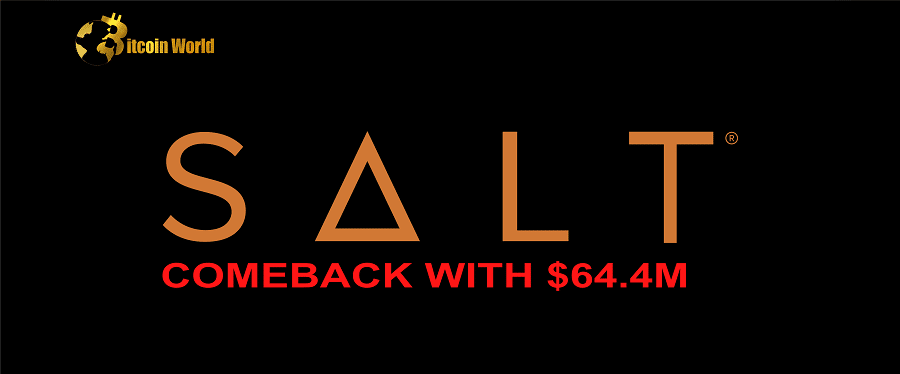The cryptocurrency lending space has been turbulent, with major players like Genesis, BlockFi, and Celsius Network facing bankruptcy. But amidst this turmoil, SALT Lending is staging a comeback. With a fresh $64.4 million in funding, SALT aims to strengthen its balance sheet and resume full operations. Let’s delve into how SALT Lending plans to navigate the crypto landscape and what this means for the future of crypto lending.
SALT Lending’s $64.4 Million Lifeline
SALT Lending, an early player in the crypto lending arena, announced the completion of a $64.4 million fundraising round on February 8. This capital injection, obtained through the sale of preferred stock to accredited investors, is earmarked for reinforcing the company’s financial position and rebuilding its capital reserves. While the Series A recapitalization is pending regulatory approval, it’s expected to pave the way for SALT to fully resume its services in the first quarter.
The Impact of the Crypto Winter and FTX Meltdown
Like many crypto firms, SALT Lending felt the sting of the crypto winter and the FTX collapse. The company had to pause withdrawals and deposits in mid-November following the FTX meltdown, as it had utilized the exchange for funding its lending activities. Shawn Owen, SALT’s founder and interim CEO, acknowledged the challenges, stating, “SALT was not immune to market dynamics, but we are committed to emerge stronger than ever.”
Challenges and Setbacks
Besides the withdrawal freeze, SALT Lending faced other hurdles, including the suspension of its California lending license and the collapse of a planned acquisition by BnkToTheFuture. Owen told Cointelegraph that the company is actively working with California regulators to reinstate the license, emphasizing transparency and education about their business model.
SALT’s Strategy for Revival
SALT Lending plans to pursue a Series B financing round later in 2023, targeting $100 million to bolster its capital buffer. Owen explained that the FTX failure significantly impacted SALT’s operations, highlighting the need for lenders to quickly sell collateral at a specific price. This requires either strong buyer connections or the ability to act as the buyer, necessitating additional funds.
Lessons Learned and Future Outlook
The near collapse of SALT provided valuable lessons, including the importance of collateralized lending, transparency, and sufficient capital reserves. Owen believes that the crypto industry will emerge stronger and more resilient. He highlighted that Bitcoin and cryptocurrency are “antifragile,” becoming stronger with each challenge.
Key Takeaways:
- Funding Boost: SALT Lending secured $64.4 million to strengthen its balance sheet.
- Overcoming Challenges: The company is addressing regulatory issues and working to reinstate its California lending license.
- Future Plans: SALT intends to raise further funds through a Series B financing round.
- Lessons Learned: The importance of collateralized lending, transparency, and capital reserves.
Will Regulation Save Crypto Lending?
Owen argues that the regulatory framework is already in place, with lenders required to be licensed on a state-by-state basis. The problem, he suggests, was not a lack of regulation but a failure to adhere to existing rules. He believes that the public is now more informed, making it unlikely that unregulated platforms offering exorbitant yields will be permitted in the future.
Will Banks Fill the Void?
While some believe that traditional financial institutions will step in to fill the market vacuum created by the crypto lending failures, Owen is skeptical. He feels that recent events have deterred banks from participating and that many institutions are more interested in central bank digital currencies. He estimates that banks are still three to four years away from becoming actively involved in crypto lending.
Actionable Insights:
- Prioritize Collateral: Ensure that all loans are backed by collateral to mitigate risk.
- Be Transparent: Maintain open and honest communication with clients to build trust.
- Build Capital Reserves: Maintain sufficient capital reserves to weather market volatility.
SALT Lending’s journey through the crypto winter offers valuable insights for the industry. By focusing on collateralized lending, transparency, and capital reserves, SALT aims to rebuild trust and emerge as a stronger player in the crypto lending space. While challenges remain, the company’s commitment to these principles may pave the way for a more resilient and sustainable future.
Disclaimer: The information provided is not trading advice, Bitcoinworld.co.in holds no liability for any investments made based on the information provided on this page. We strongly recommend independent research and/or consultation with a qualified professional before making any investment decisions.




